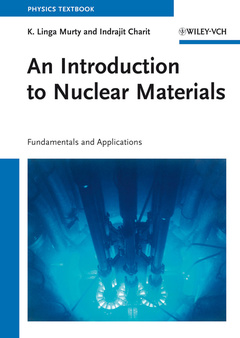Description
An Introduction to Nuclear Materials
Fundamentals and Applications
Authors: Murty K. Linga, Charit Indrajit
Language: English
Subjects for An Introduction to Nuclear Materials:
Keywords
way; aspects; accessible; fundamental; nuclear reactor; overview; systems; designs; familiarize themselves; readers; nuclear; energy; different; sections; various; materials; applications; possibilities; life; methodologies
172.94 €
In Print (Delivery period: 14 days).
Add to cartPublication date: 03-2013
398 p. · 18.3x24.9 cm · Hardback
Approximative price 73.73 €
In Print (Delivery period: 14 days).
Add to cartPublication date: 01-2013
398 p. · 17x23.9 cm · Paperback
Description
/li>Contents
/li>Biography
/li>
Covering both fundamental and advanced aspects in an accessible way, this textbook begins with an overview of nuclear reactor systems, helping readers to familiarize themselves with the varied designs. Then the readers are introduced to different possibilities for materials applications in the various sections of nuclear energy systems. Materials selection and life prediction methodologies for nuclear reactors are also presented in relation to creep, corrosion and other degradation mechanisms. An appendix compiles useful property data relevant for nuclear reactor applications.
Throughout the book, there is a thorough coverage of various materials science principles, such as physical and mechanical metallurgy, defects and diffusion and radiation effects on materials, with serious efforts made to establish structure-property correlations wherever possible. With its emphasis on the latest developments and outstanding problems in the field, this is both a valuable introduction and a ready reference for beginners and experienced practitioners alike.
Preface XV
1 Overview of Nuclear Reactor Systems and Fundamentals 1
1.1 Introduction 1
1.2 Types of Nuclear Energy 2
1.3 Neutron Classification 3
1.4 Neutron Sources 3
1.5 Interactions of Neutrons with Matter 3
1.6 Definition of Neutron Flux and Fluence 6
1.7 Neutron Cross Section 7
1.8 Types of Reactors 11
1.9 Materials Selection Criteria 28
1.10 Summary 37
Appendix 1.A 37
Additional Reading Materials 40
2 Fundamental Nature of Materials 43
2.1 Crystal Structure 43
2.2 Crystal Defects 69
2.3 Diffusion 89
Bibliography 110
3 Fundamentals of Radiation Damage 111
3.1 Displacement Threshold 114
3.2 Radiation Damage Models 118
3.3 Summary 125
Bibliography and Suggestions for Further Reading 126
Additional Reading 126
4 Dislocation Theory 127
4.1 Deformation by Slip in Single Crystals 127
4.2 Other Dislocation Characteristics 140
4.3 Dislocations in Different Crystal Structures 160
4.4 Strengthening (Hardening) Mechanisms 167
4.5 Summary 178
Bibliography 180
Additional Reading 180
5 Properties of Materials 181
5.1 Mechanical Properties 181
5.2 Thermophysical Properties 240
Appendix 5.A 260
Appendix 5.B 260
Bibliography and Suggestions for Further Reading 265
Additional Reading 266
6 Radiation Effects on Materials 267
6.1 Microstructural Changes 267
6.2 Mechanical Properties 287
6.3 Radiation Effects on Physical Properties 306
6.4 Radiation Effects on Corrosion Properties 308
6.5 Summary 314
Bibliography 316
7 Nuclear Fuels 319
7.1 Introduction 319
7.2 Metallic Fuels 321
7.3 Ceramic Fuels 347
7.4 Summary 356
Bibliography 357
Additional Reading 358
Appendix A Stress and Strain Tensors 359
Appendix B 367
Index 375
Indrajit Charit has been a member of the research staff of the Nuclear Engineering department at North Carolina State University since 2005. He received his Ph.D. degree in Metallurgical Engineering from the University of Missouri-Rolla (USA) in 2004. Dr. Charit has spent about 8 years working on various research programs involving structural materials. He has published and/or presented more than 30 papers.




